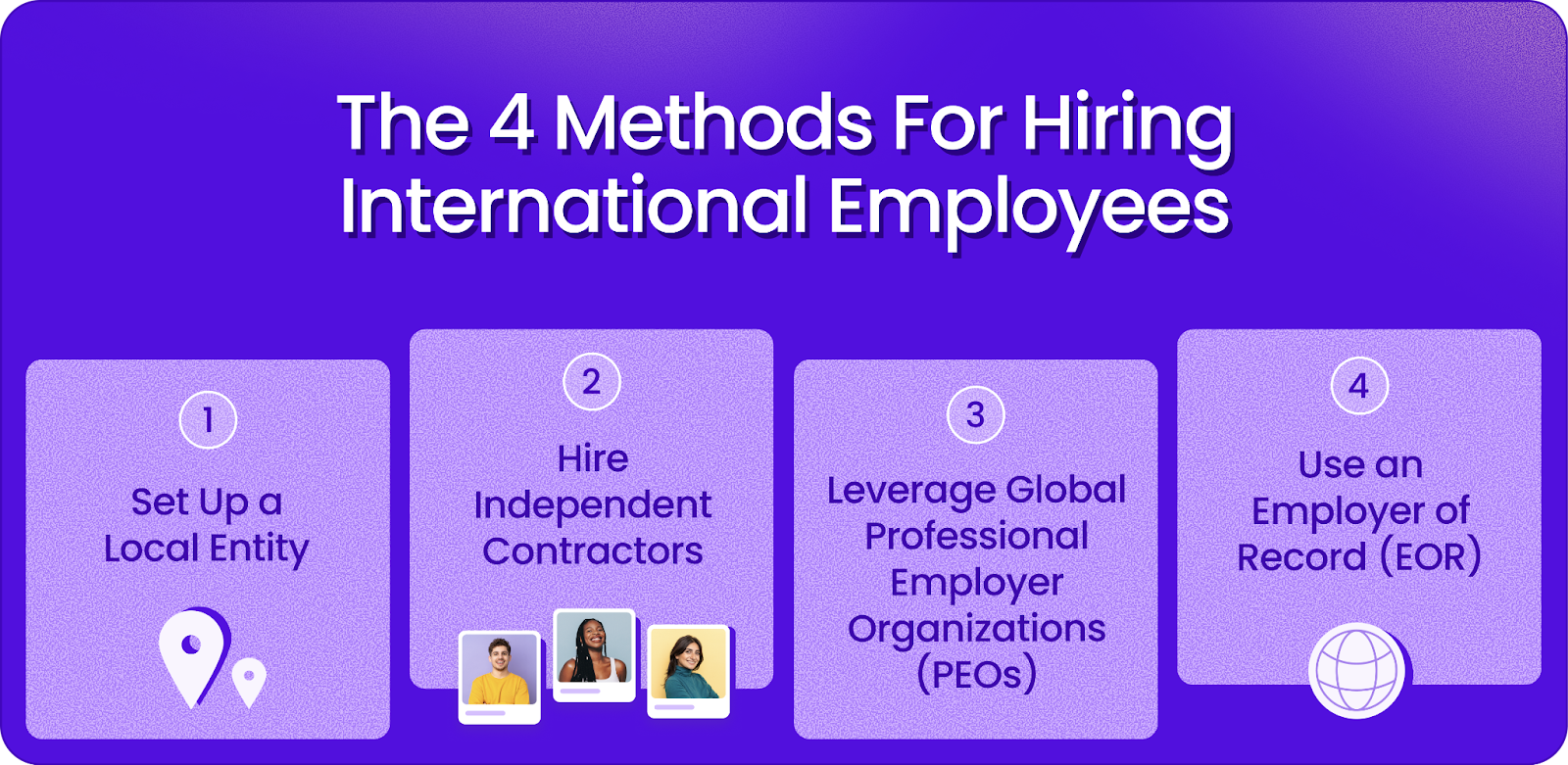Copied to Clipboard
Ready to get Started?


Key Takeaways
Payroll is now a strategic growth driver, becoming central to compliance, employee experience, and global scalability.
A trusted payroll partner ensures accuracy, transparency, and compliance across markets, helping businesses scale confidently without adding admin burden.
Platforms like Playroll unify payroll, compliance, and workforce management globally, supporting smooth transitions as companies grow from startups to enterprises.
Payroll used to be a back-office function – part of a checklist that came after hiring and before payday. In 2026, it’s one of the most strategic levers in scaling an international business. Whether you’re paying ten employees or a thousand, payroll touches every part of your business: compliance, employee experience and cash flow.
In 2026, the global payroll outsourcing market sits at an estimated $11–13 billion, reflecting continued demand from companies hiring across borders and supporting distributed workforces. As international hiring has become a standard growth strategy, payroll complexity has increased significantly, spanning multi-currency payments, country-specific tax obligations, and compliance with labor laws that continue to vary by jurisdiction. These realities have made it clear that one-size-fits-all payroll systems are no longer sufficient for modern global teams.
The right system can save HR teams significant time every week, cut payroll costs by nearly 50%, and eliminate compliance issues before they materialize. The wrong one can stall your expansion and frustrate employees before they’ve received their first payslip.
This guide will walk you through how to choose a payroll provider confidently – why the decision matters more than ever, how to align your payroll model with your growth stage, and which ten factors to evaluate before signing on the dotted line.
Why the Right Payroll Provider Matters for Global Growth
A decade ago, payroll was simple: one office, one bank, one tax authority. Today, even small business owners often manage teams scattered across continents. The world of work has changed faster than most payroll systems.
That change brings three key realities:
- Global complexity is the new normal: Every new market means new tax laws, benefits, and reporting cycles. A strong international payroll provider helps businesses stay compliant without adding headcount to finance or HR.
- The employee experience travels with your brand: Whether a developer in Berlin or a designer in Cape Town, every employee expects accuracy and transparency. Delayed payroll processing or confusing deductions can damage trust overnight.
- The right tech drives smarter scaling: Cloud-based payroll systems now give leadership teams visibility into costs, headcount, and compliance health across every country. The right system will help your team make better decisions.
It’s common for growing teams to realize that a patchwork of local payroll vendors makes life harder, not easier. Without one clear system, every new market adds more spreadsheets, emails, and risk – like trying to build a house when everyone’s working with a different set of plans.
Understanding Your Payroll Model Options
Before comparing providers, it’s important to understand what kind of payroll model you actually need. There isn’t one “best” model – there’s a best fit depending on your market maturity, entity structure, and hiring timelines. Full-service payroll providers, like Playroll, can handle everything from onboarding and benefits administration to federal, state, and local tax compliance.
The right partner should adapt as your needs change, helping your business scale without disrupting workflows or risking compliance.
10 Critical Criteria For Choosing a Payroll Provider (Beyond Features)
With so many payroll software solutions on the market – from global platforms to local specialists – it’s easy to get overwhelmed. The trick is to look past the buzzwords and find a provider that actually fits your business model, your growth plans, and your people.
Here’s how to cut through the noise and make an informed choice.
1. Compliance & Local Statutory Expertise (by Country)
When you’re hiring across borders, compliance should be the foundation of your payroll strategy. Each country has its own employment laws, social contributions, tax filing schedules, and benefits obligations. The right provider should have proven, in-country expertise to keep you compliant with local, state, and federal regulations automatically.
Ask how often the payroll provider updates their compliance database and whether they rely on internal teams or external partners to stay current. Look for detailed, country-by-country guidance on labor laws, tax rates, and filing requirements – and ensure your provider can adapt quickly as regulations evolve.
2. Multi-Entity Consolidation & Unified Reporting
If you’re operating across multiple entities, having full visibility over operations becomes non-negotiable. A unified global payroll system should consolidate data across all regions into one platform – giving your teams access to real-time reports on headcount, payroll costs, and compliance status.
Pro Tip: Ask whether the provider supports consolidated reporting and data flow. The best international payroll systems offer global dashboards that let you filter by country, entity, or cost center, helping you make faster decisions without jumping between spreadsheets.
3. Currency & Payout Rails (FX, Local Bank Integration)
Multi-currency payroll introduces complexity around exchange rates, rounding, and payment timing. If you’ve ever sent payroll across borders, you know the pain – one week the euro strengthens, the next the rupee drops, and suddenly someone’s take-home pay is off by just enough to cause confusion. Even tiny rounding differences or delayed conversions can turn payday into a major headache.
A strong payroll partner should offer access to reliable FX rates, local payout rails, and integrations with in-country banks so that employees are paid accurately and on time.
Ask about transaction fees, settlement times, and whether funds move through local bank accounts or centralized wallets. Transparent FX handling and local payment capabilities protect both your team and your bottom line from unnecessary costs and delays.
4. Data & Integration Architecture (API, Data Model, Sandbox)
There’s nothing worse than realizing your shiny new payroll platform doesn’t talk to your HR or finance tools – you end up manually uploading CSVs at midnight just to close the books. The right payroll partner should slot effortlessly into your existing stack, syncing data between HR, finance, and payroll without interrupting your team’s workflow.
Look for a provider with modern, cloud-based architecture, open APIs, and standardized data models that make integration simple and secure. Ask if they provide a sandbox or testing environment, and what kind of API documentation or developer support is available. A well-structured integration layer ensures payroll data flows cleanly between systems like your HRIS, accounting software, and benefits administration tools.
(P.S. Playroll’s payroll reporting & analytics software integrates with all of your existing vendors, meaning no disruption to your team’s workflow 😉)
5. Pricing Transparency (Country-by-Country Cost, TCO)
Payroll pricing can vary dramatically by region. The best providers make it easy to understand your total cost of ownership – including per-employee fees, country-specific charges, FX margins, and add-ons like tax filing or compliance support.
Ask for a detailed cost breakdown by country and confirm what’s included in the base price. Transparent pricing helps you budget accurately and avoid the hidden fees that often accompany fragmented local vendors.
6. Scalability (Adding New Jurisdictions, Headcount Growth)
As your team expands globally, your payroll provider should be able to keep pace. That means easily adding new entities, full time employees, and contractors without overhauling your systems.
Ask how quickly they can onboard a new country and whether the platform supports hybrid models. For example, you might want to use a mix of EOR, contractor, and owned entity payrolls depending on your needs per region. A scalable payroll partner grows with you, not against you, making expansion smooth instead of stressful.

7. Employee Experience & Multi-Language Support
When people can see exactly how they’re being paid, in their own currency and language, it builds confidence and loyalty. A great payroll partner makes that simple, with self-service portals, clear digital pay stubs, and responsive local support.
Instead of your HR or finance team fielding endless “Can you resend my payslip?” messages, employees can log in, download their payslips, and get answers instantly. It saves your team hours of manual admin every month and gives employees the transparency they deserve.
8. Audit Readiness and SLA / Guarantees
Payroll mistakes are costly. Choose a provider that offers formal Service Level Agreements (SLAs) and clear audit trails for every transaction. This ensures accountability, data integrity, and peace of mind when auditors or regulators come calling.
Ask if they provide downloadable audit logs or compliance certifications (like ISO 27001 or SOC 2). Providers that take audit readiness seriously will have documented processes and uptime guarantees that demonstrate operational maturity.
9. Vendor Liquidity & Business Continuity
Global payroll relies on secure fund flows and financial stability. Evaluate your provider’s liquidity, capital structure, and contingency planning. What happens if a banking partner fails or a local payment network goes down?
The right provider will have multiple payout pathways, regional redundancy, and strong cash management controls. Business continuity is critical for ensuring your employees get paid, no matter what.
10. Implementation & Onboarding Timeline
Finally, ask what implementation actually looks like. Some providers promise “go live in weeks” but require months of setup and data mapping. A transparent partner will give you a clear project plan, milestones, and dedicated onboarding support.
Request a sample onboarding checklist that includes system configuration, compliance registration, and testing. The smoother your implementation, the faster your HR and finance teams can get back to focusing on strategy instead of setup.
How Global Payroll Differs from Domestic or Single-Country Solutions
Running payroll in one country is hard enough – running it across ten is a completely different story. Each market comes with its own set of rules, expectations, and moving parts. What works smoothly at home can quickly turn into a maze of compliance hurdles and coordination challenges abroad.
Here’s what makes global payroll so complex, and what to look out for as you expand:
Local Compliance
Every country has its own laws around employment, taxes, and social contributions. Filing deadlines, benefit obligations, and reporting formats vary widely – and they can change at any time. Staying compliant means keeping pace with new regulations, understanding local tax authorities, and ensuring every payslip meets legal standards.
Currency and FX Impact
When you’re paying people in multiple currencies, even small exchange rate shifts can impact costs and cash flow. Payroll teams need to manage currency conversions carefully, monitor rounding differences, and ensure employees receive the correct net pay in their local currency. Transparent FX processes help keep payroll accurate and predictable.
Entity Setup
Paying employees in-country often requires legal infrastructure – from setting up a local entity and registering for tax IDs to opening approved bank accounts. Each step can take weeks or months and involves coordination with local regulators. Without this groundwork, it’s impossible to process compliant payroll or remit taxes correctly.
Vendor Coordination
Working with multiple local vendors can quickly become a logistical puzzle. Some handle filings and payments end-to-end; others expect you to manage submissions yourself. Each provider may have their own systems, timelines, and support expectations. The more markets you enter, the harder it becomes to maintain consistency and visibility across payrolls.
The Takeaway
Global expansion amplifies the complexity of payroll operations – but it’s not unmanageable with the right systems and expertise in place. Building a scalable payroll foundation early helps protect your business from fines, delays, and compliance risk while giving your team the confidence to hire wherever the talent is.
Comparing Leading Payroll and Workforce Platforms (2026 Snapshot)
Choosing the right payroll and workforce management platform is about finding a solution that truly fits your business phase, structure, and global ambitions. Below is a quick snapshot of some of the leading players in the market today, showing how each one could give your company an advantage.
This table gives you a side-by-side look at which platforms serve different needs best – from large enterprises with complex HR ecosystems to scaling startups building distributed teams.
Global Payroll the Easy Way
Every platform on this list brings something valuable to the table. The real question is what matters most for your stage of growth. If you’re managing a single-country workforce, a local payroll or scheduling tool might be enough. But if your ambitions (and your hires) are global, you’ll need a platform that scales with you – one that handles compliance, payroll, and cross-border payments in one place.
That’s where we believe Playroll stands out. It’s built for businesses growing beyond borders, combining EOR services, contractor management and global payroll into one transparent, easy-to-use platform.
With seamless integrations, upfront pricing, and full compliance baked in, Playroll lets you focus on building your team instead of battling bureaucracy. Book a demo today to see how Playroll helps teams hire anywhere, stay compliant everywhere, and get payroll right every time.
Payroll Provider FAQs
What should I look for in a payroll provider?

.png)
When you’re deciding between payroll providers look for experience, compliance coverage, scalability, integrations, and responsive support – but also transparency. A great payroll provider should help you stay compliant across multiple jurisdictions, grow effortlessly as you add new hires, and integrate with your existing HR and finance tools.
Most importantly, you should feel confident that they’ll respond quickly when something urgent comes up.
Who is the best payroll provider?

.png)
The best payroll provider for you will depend on your size, structure, and stage of growth – there’s no one-size-fits-all answer. Large enterprises often prefer established platforms built for complex HR ecosystems, while scaling companies tend to choose modern solutions like Playroll for their automation, flexibility, and global compliance coverage. The best provider is the one that fits your business, not just your budget.
Is it better to outsource payroll or manage it in-house?

.png)
Outsourcing payroll can save your business significant time, reduce compliance risk, and free your team to focus on strategy instead of administration – especially if you’re hiring internationally.
In-house payroll can work for smaller, single-country teams, but as soon as you start paying people across borders, an outsourced or managed solution quickly becomes the safer, more efficient choice.
Can one provider handle both EOR and in-country payroll?

.png)
Yes – modern platforms like Playroll are designed to support both. You can start by hiring through an EOR for speed and compliance, then transition to your own in-country payroll as you establish local entities. This hybrid approach gives you the flexibility to expand globally without rethinking your systems every time you grow.
.svg)
.svg)
.svg)

.svg)
.svg)




.png)


.png)

.svg)


.jpg)












.svg)